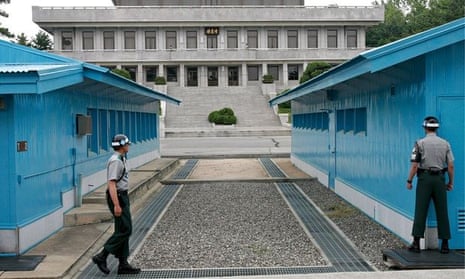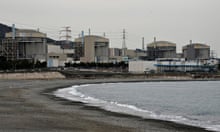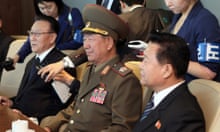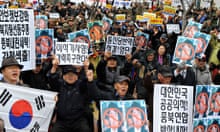South Korea’s constitutional court has ordered the dissolution of a small leftist political party hounded by claims of pro-North Korea views, a move critics say exposes limits of freedom of expression in a country once ruled by military dictators.
The justice ministry petitioned the court to disband the Unified Progressive party (UPP) in November 2013, accusing it of supporting North Korea-style socialist systems and posing a threat to South Korea’s liberal democracy. The request was made two months after key party members were arrested for allegedly plotting a pro-Pyongyang rebellion to overthrow the South Korean government in the event of a war on the Korean peninsula.
The party was founded in late 2011 with a merger of small progressive groups, and has five lawmakers, all of whom, the court ruled, are to be deprived of their seats.
It is the first time the court has ordered the breakup of a political party since it was founded in 1988 to better protect basic public rights. In the late 1980s, South Korea was evolving into a genuine democracy following decades of military-backed dictatorships. Previously, authoritarian leaders, including the father of the current president, Park Geun-hye, arbitrarily dissolved parliament and political groups, and banned party activities to suppress their rivals.
UPP members have said they want only greater reconciliation with North Korea. They accuse the country’s spy service of fabricating the rebellion charges to divert criticism over revelations that spy agents launched illicit online campaigning to help then ruling party candidate, now the president, win elections in December 2012.
The rebellion charges led to the conviction of seven party members now serving prison terms of up to nine years for either inciting rebellion or violating the country’s anti-Pyongyang security law.
The verdict will add to the criticism that Park’s government infringes upon freedom of speech and could further aggravate a bitter political divide between the right and left. Park’s liberal rivals have said her heavy-handed style is similar to that of her father, former president Park Chung-hee, who ruled the country for 18 years until his assassination in 1979.
“The ban on the UPP raises serious questions as to the authorities’ commitment to freedom of expression and association,” Roseann Rife, East Asia research director at Amnesty International, said in a statement. “Security concerns must never be used as an excuse to deny people the right to express different political views.”
Much of South Korea’s internal division is about how to view rival North Korea. The South has shared the world’s mostly heavily fortified border with the North since their three-year war in the early 1950s. In South Korea, even praising the North can be punished with up to seven years in prison.





Comments (…)
Sign in or create your Guardian account to join the discussion